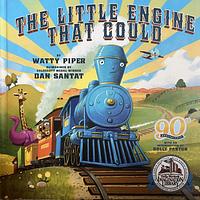You need to sign in or sign up before continuing.
Take a photo of a barcode or cover
adventurous
hopeful
lighthearted
fast-paced
Plot or Character Driven:
A mix
Strong character development:
No
Loveable characters:
Yes
Diverse cast of characters:
No
Flaws of characters a main focus:
Yes
A classic that holds up, even today. Read it to the 3 yo and got a request to READ IT AGAIN! Great story about helping and about perseverance.
Age: 2-5
Media: watercolor and ink
A great book for younger children and children just learning to read.
Although some of the toys mentioned are out-of-date (children may not know what they are) and the pictures corresponding to the text are somewhat repetitious, the writing of the story is still captivating for younger children (phrase repetition, simplified words with few syllables, theme of accomplishing what may seem impossible).
About the original 1930 edition I have, the Little Engine is a female working against the odds of those who refuse to help her succeed. She is an excellent role model for the young girls.
Media: watercolor and ink
A great book for younger children and children just learning to read.
Although some of the toys mentioned are out-of-date (children may not know what they are) and the pictures corresponding to the text are somewhat repetitious, the writing of the story is still captivating for younger children (phrase repetition, simplified words with few syllables, theme of accomplishing what may seem impossible).
About the original 1930 edition I have, the Little Engine is a female working against the odds of those who refuse to help her succeed. She is an excellent role model for the young girls.
Read it to my daughter, I never read it as a child, such a great, timeless classic.
Piper, Watty, and Loren Long. The Little Engine That Could. New York: Philomel :, 1930. Print. Classic. The Little Engine That Could is about a little train that has to take one a big load that is just too much for him to handle, but the Engine keeps rolling uphill even when it was too hard. This story is fantastic. It has such a good message for anyone no matter the age. The meaning behind the story anyone can do hard things! This is a great story to read in class because kids struggle with school and it can show them that they are capable of doing hard things. I’ve noticed the difference between teachers that believe in their students and teachers that are just there for their jobs. It brings in a whole new perspective for students when the teachers are encouraging.
hopeful
lighthearted
fast-paced
don't like this book anymore because my teachers in elementary school always used it as a lesson ):
It doesn't hurt to start out in life thinking that you can, even though eventually, you get to the point where you realize that you probably can't.




